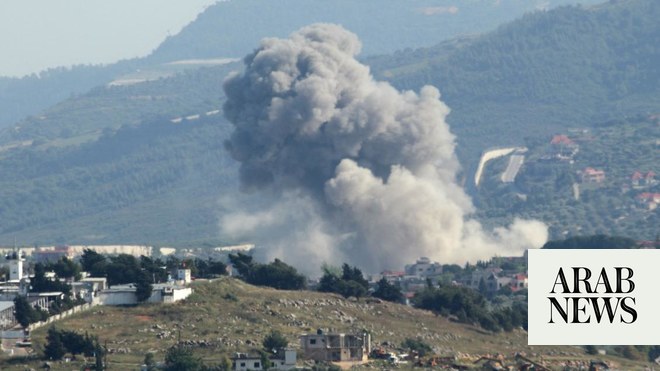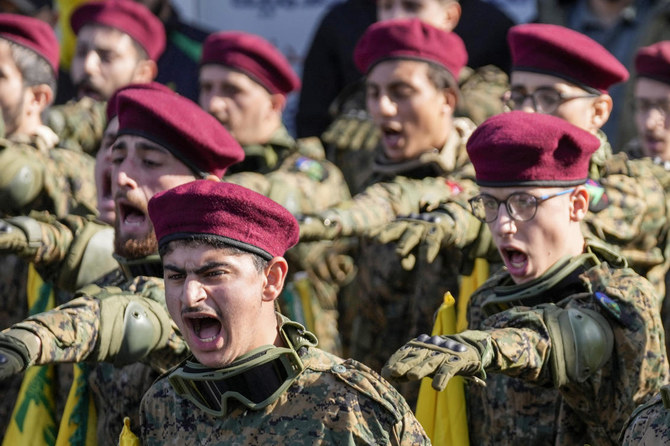
Mohammed Naameh Nasser, known as Abu Naameh, was the commander of the Aziz Unit which is responsible for the western sector of southern Lebanon
The intensity of Israeli attacks has fluctuated over the past few days
BEIRUT: An Israeli drone targeted a car east of the city of Tyre on Wednesday, killing a senior Hezbollah commander and severely injuring a second man who later died as a result.
Mohammed Naameh Nasser, known as Abu Naameh, was the commander of the Aziz Unit which is responsible for the western sector of southern Lebanon.
He held a position equal to that of Taleb Sami Abdullah, known as Abu Taleb, who was assassinated two weeks ago.
Abu Taleb, commander of the Nasr Unit, was the first senior field commander to be killed in the ongoing conflict with the Israeli army for eight months. He died in an Israeli airstrike that targeted a house in the town of Jouaiyya, about 15 km from the southern border. Three Hezbollah cadres were killed alongside him.
The intensity of Israeli attacks has fluctuated over the past few days. Attacks began on Wednesday morning with a combat drone shelling the town square in Taybeh. The border town of Kfarkela was subjected to Israeli artillery shelling at dawn, with an Israeli Merkava tank targeting a house near the border wall.
Prime Minister Najib Mikati said: “The Israeli attacks on the south and the deliberate killing of its people, the destruction of towns, and the burning of crops, are terrorist aggression; the international community must put an end to its persistence and crimes.”
He reiterated his question to “international stakeholders involved in initiatives” about “the steps taken to maintain calm, exercise restraint on the southern border, curb the enemy, and stop the approach of killing and destruction,” noting “the escalating Israeli violations of national sovereignty and its ongoing and extensive breach of UN Security Council Resolution 1701.”
Mikati added: “Lebanon’s choice has always been and still is peace. Our culture is one of peace built on rights, justice, and international law, especially Resolution 1701. But we are a people who will not accept attacks on our sovereignty, national dignity, and the safety of our lands and civilians, especially children and women.
“Violations of all agreements and genocide against the Palestinians in Gaza must not go unnoticed by the world, which is passively watching the ongoing aggression.”
He added: “The essence of peace is for the Palestinian people to live on their land in a free and independent state, and any attempt to bypass these principles will lead to further crises in the Middle East and the world.”
Lebanon is counting on the American-French initiative to prevent further escalation in the south of the country.
A meeting is scheduled between Jean-Yves le Drian, the French envoy to Lebanon, and American envoy Amos Hochstein. This will focus on de-escalation as a solution to repatriating displaced persons on both sides of the Blue Line.
On the eve of Hochstein’s arrival in Paris, French President Emmanuel Macron stressed in a phone call to Israeli Prime Minister Benjamin Netanyahu “the absolute importance” of preventing an escalation of the situation between Israel and Hezbollah in Lebanon.
A statement from the Elysee Palace said that Macron emphasized “the urgent need for all parties to move quickly toward a diplomatic solution and stressed the necessity of exercising the utmost restraint.” It added that during the phone call the two leaders discussed ongoing diplomatic efforts.
In Beirut, the deputy head of Hezbollah, Sheikh Naim Qassem, told the Associated Press that “the only confirmed way to achieve a ceasefire on the Lebanese border is through a comprehensive ceasefire in Gaza.”
He described Hezbollah’s participation in supporting Gaza as a “front of support for the steadfast Palestinian people and their valiant resistance.”
He added: “If the war stops, this military support will no longer exist,” and continued: “If Israel reduces its military operations without a formal ceasefire agreement and complete withdrawal from Gaza, the implications of the border conflict between Lebanon and Israel will be less clear.
“If what will happen in Gaza is a combination between a ceasefire and no ceasefire, war and no war, then we cannot answer what our reaction will be now, because we do not know its form, results and effects.”
Qassem warned that if Israel intended to launch a limited operation in Lebanon that did not amount to a comprehensive war, it should not expect the fighting to remain limited.
“It should expect that our response and resistance will not be within the ceiling and rules of engagement determined by Israel,” he said.
Tehran heightened its support for Hezbollah in the face of a potential Israeli attack.
Kamal Kharazi, the foreign affairs adviser to Iranian Supreme Leader Ali Khamenei, told the Financial Times that “in the event of a broad Israeli offensive against Hezbollah, there is a risk of sparking a regional conflict where Tehran and the resistance axis will back Hezbollah fully.”
However, he emphasized that “Iran does not seek a regional war and that expanding the conflict is not beneficial to anyone.”










